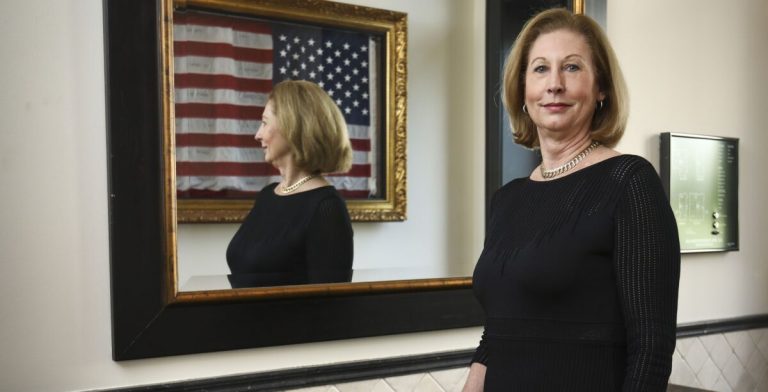Private attorney Sidney Powell provided Zenger News with a 270-page binder supporting her multiple cases alleging widespread election fraud in the 2020 U.S. presidential election. Powell has cases pending in the Supreme Court regarding the states of Michigan, Georgia, Arizona, and Wisconsin. Her supporting documents in each case are between 1000 and 2000 pages long.
Zenger conducted the interview on Dec. 18 from Powell’s suite in the Trump International Hotel in Washington, D.C.
Powell says she attended a four-and-a-half hour meeting with President Trump on Dec. 18 where President Donald Trump was considering appointing Powell as a Special White House Counsel. While only the Attorney General can appoint a Special Counsel, the president can appoint his own with reduced powers.
However, Powell claims that during the meeting, several White House aides opposed her appointment and even shouted down the president. She says she has since been blocked from the White House. “I’ve been blocked from speaking to or communicating with the president since I left the Oval Office on Friday night,” she told Zenger.
Martial law claims ‘not discussed’ on Dec. 18
Several big media outlets have cited anonymous claims that radical approaches such as declaring martial law, using the military to seize voting machines, or re-running the election in the battleground states was discussed at the meeting.
Success
You are now signed up for our newsletter
Success
Check your email to complete sign up
Powell says all such claims are unfounded. “I can tell you for sure… that was not discussed in the Oval Office Friday night,” she said.

Former National Security Advisor Lt. Gen. Michael Flynn accompanied Powell to the meeting and confirmed her side of the story: “No one talked about martial law, no matter what some of the news reports say,” he said.
Powell’s binder primarily contains generic information such as CISA-FBI Alerts on Iranian Advanced Persistent Threats targeting voter registration data and election-related systems, a Senate Report on Russian interference in the 2016 presidential election, the speculative-but-insightful Antrim County Audit of Dominion Voting’s systems, a copy of Trump’s Executive Order on foreign interference in election fraud, a printout of Peter Navarro’s report, and other supporting documents.
While most of the binder’s contents hardly count as evidence and are circumstantial at best, it does, however, contain three noteworthy redacted affidavits. Page 117 of the Binder appears to show a redacted affidavit relating to Trump’s 2018 Executive Order requiring an investigation by the Director of National Intelligence on foreign interference in a Federal Election to occur within 45 days.
The affidavit purports to show that the SSL certificate for dominionvoting.com was accessed from Serbia, Denver, and Toronto. However, the evidence provided does not show either the date or time of when the access occurred.
The redacted affidavit brings forward concerns about the supply chain used to manufacture Dominion’s machinery because it is linked to China: “One in five components used in voting machines are from China-based companies.”
A second redacted affidavit on Page 125 of the binder claims that many of Dominion’s employees had their personal information posted online prior to the election, but have since had it scrubbed from the Internet. The affidavit claims that using methods of retrieval, they found that Xiaolong (Andy) Huang, Core Infrastructure Manager of IT at Dominion Voting, previously worked for the Chinese Communist Party (CCP).
Huang worked for China Telecom, a state-run enterprise that was placed on a Pentagon blacklist for companies controlled by the CCP’s People’s Liberation Army earlier this year, from 1998 to 2002.

Huang studied at Canada’s Dalhousie University and also worked at Cisco, one of the leading manufacturers of equipment for the CCP’s complete Internet surveillance and control scheme, the “Great Firewall of China.”
He also controls a shell company called OrientalNet Consulting that operates out of Xiamen, Fujian Province. The company is listed as a jewelry trading company.
Sequoia Capital China
Page 132 of the Binder reveals a connection between Sequoia Capital China’s founder, Neil Shen Nan Peng, a World Economic Forum Member who has held many positions inside China and Dominion.
Sequoia Capital China, not to be confused with the Venezuela-linked Sequoia Voting Systems Dominion acquired in 2010, provided funding for Dominion and also acquired 18 of its patents along with Toronto-based Chinese bank HSBC, according to the binder.
Among the patents acquired by HSBC are “Electronic Correction of Voter-Marked Paper Ballot,” “Ballot Adjudication in Voting Systems Utilizing Ballot Images,” and “System Method and Computer Program for Vote Tabulation with an Electronic Audit Trail.”
Another redacted affidavit on Page 157 of the binder shows a Nov. 8 public scan of Dominionvoting.com appeared to reveal “13 unencrypted passwords for Dominion employees, and 75 hashed passwords available in TOR nodes,” while the same public scan appeared to show connections to Dominion’s Belgrade offices.
The same Affidavit also claims evidence of Chinese access to the network. However, the screenshot it provides is from a mobile phone and is very difficult to read.
Powell says that she and her team are “still collecting evidence through fire hoses.”
In her Zenger interview, Powell cited a decision by Federal Judge Amy Totenberg from the U.S. District Court for the Northern District of Georgia where Judge Totenberg said “stealth vote alteration or operational interference risks posed by malware that can be effectively invisible to detection, whether intentionally seeded or not, are high once implanted” if election systems are not properly protected and audited.
Totenberg also stated that the risks ”are neither hypothetical nor remote under the current circumstances.”
The decision was in an October case, Curling v. Raffensperger, where a citizen sued Georgia Secretary of State Brad Raffensperger over concerns of the usage of electronic ballot marking devices, such as Dominion’s suite of hardware and software, during the then-upcoming presidential election.
However, Powell did not provide Zenger with any evidence that the fraud Totenberg was concerned of in the October hearing had materialized in November.
Follow us on Twitter or subscribe to our weekly email
















